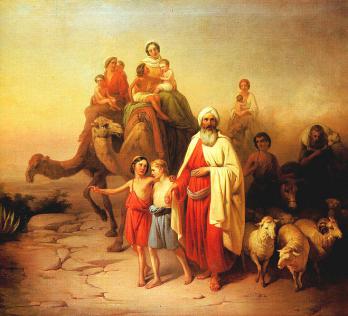Every week, parshaoftheweek.com brings you a rich selection of material on parshat hashavua, the weekly portion traditionally read in synagogues all over the world. Using both classic and contemporary material, we take a look at these portions in a fresh way, relating them to both ancient Jewish concerns as well as cutting-edge modern issues and topics. We also bring you material on the Jewish holidays, as well as insights into life cycle rituals and events...
Typically, we make a big deal of Avraham’s obeying God’s commandment and leaving his home for an unknown destination. This behavior is meant to highlight Avraham’s obedience to and trust in God, and his willingness to sacrifice the comforts and certainties of the known for the unknown destiny which God had in store for him. Avraham’s willingness to follow the commandment and just pick up and go is seen as a fabulous act of faith.
If we look at Rashi’s commentary on the words “Lech lecha” – “Get thee out” – as well as at the next two Biblical verses, we see that things are not quite so straightforward. Rashi understands the phrase לך לך"” - “Get thee out” as indicating that God is thinking of “thee” – Avraham. He is assuring Avraham that this trip will be good for him; I will take care of you, and you will benefit from it, He is saying. Rashi explains, relying on the next two verses, in which God explicitly promises that He will make Avraham into a great nation , and bless him, and make him famous (“and I will magnify your name”), that travel is normally a daunting proposition; costly, unhealthy, diminishing. It is hard to raise a family while traveling, hard to make ends meet, hard to grow as a person and be recognized as such. God, therefore, assures Avraham that he will suffer none of these negative natural consequences of his trip. On the contrary, God assures him, he will be rich, famous, and fruitful.
This certainly seems to undercut the role of Avraham as some sort of knight of faith, obediently following God’s commandment no matter what the cost or difficulty involved. How hard could it have been to go, if God Himself promised him that it will all work out so well?
There is an important lesson here. We all, one way or another, follow a God. It might be God, or it might be a set of beliefs, ideals, traditions, ideologies, which derive from one or another source or system. Our being told that Avraham obeyed only after being reassured by his source – God - that the demand being made on him was a healthy one, a productive one, a sensible one, teaches us a lesson about the importance of never losing sight of our innate, natural sense of self preservation and self regard. God, it turns out, is not asking Avraham to do anything crazy, self-negating, unreasonable, or unhealthy. Avraham, it turns out, is entitled to wonder if following God’s command makes sense – Will I be impoverished if I obey? Will it become harder, or impossible, for me to raise a family if I do as He asks? What will it do to me as a person? Does it make sense?
The Torah, and Rashi’s commentary, stresses that it is not a lack of faith to wonder whether or not a religious imperative is healthy, helpful, and productive; it is the way faith is meant to work. Just as Avraham had the right to be reassured by God that the trip to Canaan was a good idea, from the simple, human perspective of making a living, having a family, and a “name” – maintaining one’s autonomy and personhood – we all have the right to question an ideology, a power structure, a leader, in the same way: from a perspective of the most basic, natural needs we have. Does this leader/system/religious, legal, or social imperative leave room for me to take care of myself and my family? To have a family? To have a “name” of my own? To maintain the basic autonomy needed to be a person? Only once an affirmative answer can be given, should one think of obeying.
Our basic, natural, human needs, our right to maintain our personhood, must always trump whatever we believe to be an ideological imperative. That is what God was explaining to Avraham, in their first encounter, when He told him how good this first commandment was going to be for him, as a person.
Shabbat Shalom,
Shimon



Get inspired by Lech-Lecha Divrei Torah from previous years